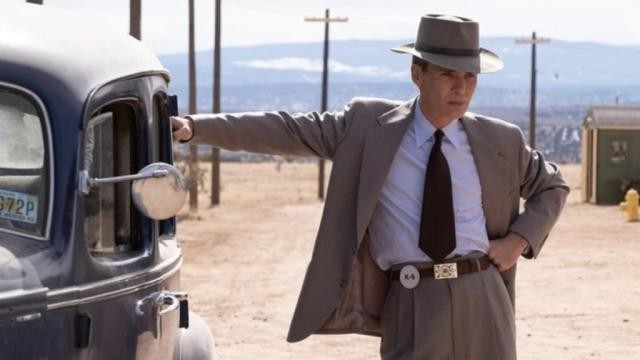In this FandomWire Video Essay, we explore why Oppenheimer EXPLODED at the box office.
Check out the video below:
Subscribe & hit the Notification Bell so you never miss a video!
Oppenheimer Box Office Success
This larger-than-life on-screen moment is indicative of the explosive impact that Christopher Nolan’s Oppenheimer would have on the worldwide box office. Launched to the forefront of pop culture through the meme-able Barbenheimer movement, this film defied the odds of what audiences expect from a biographical drama to become the awards darling and box office sensation of 2023.
So, how did it do it? How did a partially black-and-white biopic centered on the creator of the atomic bomb, unfolding in a non-linear fashion defy the odds to win over not only critics… but general audiences? Well, hunker down and prepare for the blast wave as we dive into how Oppenheimer EXPLODED the box office.
While Barbie’s feat of becoming the highest-grossing movie of 2023 and making more than $600 million in the United States and almost $1.5 billion worldwide is undoubtedly impressive, it’s even more impressive what Oppenheimer was able to do despite the litany of factors working against it.
Firstly, a movie with this subject matter is probably not what most people would think of when they imagine a cinematic blockbuster event. A film about a bunch of scientists conducting incredibly complex calculations to create the atomic bomb hardly sounds like the most riveting film. Yet there’s so much more to the movie than it lets on — and it’s far more entertaining than you’d expect from the premise.
Furthermore, the film is a biopic — a genre that audiences have become increasingly wary of. Granted, in the hands of a filmmaker like Christopher Nolan, cinephiles knew that Oppenheimer would be anything but traditional in its presentation. However, this story has been told in film and television several times. It took a bit of extra convincing to get general audiences to understand that this is a very different vision of the Manhattan Project.

Beyond the film’s story being a tough sell, Oppenheimer was rated R, which prevents a segment of its potential audience from seeing it in theaters. Because of the R rating, anyone under 17 had to have a parent or guardian accompany them to the theater to see it. This also means that few parents would bring their children to the movie. Few R-rated movies can break out because of the limitations on who can see them.
There’s also the fact that it’s a 3-hour-long movie, which presents several challenges for a film’s success at the box office. Today, with people’s attention spans being shorter than ever, it’s hard to convince people to see a 3-hour movie in theaters. And from a purely logistical standpoint, the film also suffers in terms of theatrical booking. A film that long limits the number of shows that can be played per day on a single screen. Thus, on top of convincing audiences to go out to the theater, Oppenheimer had fewer times for moviegoers to choose from.
Of course, there were also external factors that could not be controlled. One of the biggest things working against the film was the SAG strike, which began in the middle of Oppenheimer’s London premiere, prompting many of the cast to walk out of the screening in solitude. Although the studio got an early jump on promotion to harness the marketing power of the A-list cast before it was too late, the film did not benefit from the “traditional” press cycle that most blockbusters get.
Oppenheimer also entered a box office that was increasingly hostile towards adult-oriented fare. If you look at the top-performing movies since the COVID-19 pandemic, most are either franchise films or four-quadrant blockbusters. The most successful original drama since 2020 was the Austin Butler-starring Elvis, which made $150 million in the US. However, this is a fraction of what many films of its genre made at the box office before the pandemic, like Bohemian Rhapsody, which made $216 million.
Yet despite that all, Oppenheimer managed to be a massive success at the box office, racking up more than $325 million at the US box office and more than $950 million worldwide. How did a movie that, on paper, isn’t even close to what one would expect a blockbuster to look like come so close to joining the one billion club? The truth is, there are several reasons why this miraculously became one of the year’s biggest films.
The first factor that worked in Oppenheimer‘s favor was its good reviews. When critics saw the film, they immediately heralded it as one of the best of the year, some even calling it an immediate Best Picture frontrunner come awards season — a prediction which, unsurprisingly, came true as the film dominated most awards ceremonies. With an 89 on Metacritic and a 93% on Rotten Tomatoes, there was no question that the film was near-universally considered a masterpiece.
Audiences were also clamoring at the time for high-quality films. Although other movies in the summer had been well-liked enough, such as Spider-Man: Across the Spider-Verse and Mission: Impossible – Dead Reckoning, those don’t have quite the same appeal as something like Oppenheimer. Oppenheimer was able to fill a niche at the box office that had largely been unfulfilled up to that point in the summer.
A big part of Oppenheimer’s success is also the star power in the cast. Being one of the most acclaimed filmmakers working today, Nolan had no problem recruiting a massive ensemble to bring the enormous list of people involved in the Manhattan Project to the screen. From bonafide movie stars like Robert Downey Jr., Matt Damon, and Emily Blunt to actors known for their pedigree like Cillian Murphy and Florence Pugh. the cast had what it took to attract cinephiles while remaining appealing to mainstream audiences.
That being said, the biggest star of Oppenheimer is not its cast but its director. Christopher Nolan is one of the few remaining filmmakers who is able to turn his latest work into an event movie, regardless of how hard of a sell it is. From high-concept sci-fi to a war thriller and now a heady biopic, Nolan has convinced audiences to see his movies when they would have been a difficult sell in anyone else’s hands.
Summer 2023 also saw several would-be blockbusters fail at the box office. The DC superhero epic The Flash had its success dampened by controversy involving its star, Ezra Miller, and news of a total reset for the DC Extended Universe that rendered the movie inconsequential to the canon. The Pixar movie Elemental had solid legs but was hardly a smash hit on the level of some of the studio’s past output. Indiana Jones and the Dial of Destiny ended up being one of the costliest bombs of the year. And after dominating the box office in 2022 with Top Gun: Maverick, Tom Cruise failed to recapture the same magic with Mission: Impossible – Dead Reckoning.
Audiences have rejected movies that fit the traditional image of a blockbuster over the past year, so it’s no surprise that something unorthodox and unique like Oppenheimer is what ended up connecting with moviegoers. Audience’s tastes have shifted, and they are tired of seeing the same thing. Oppenheimer offered them something different.
Universal and Christopher Nolan also succeeded in making the film into a bonafide theatrical event. The film was marketed as an experience meant to be seen in the theater, with the studio heavily pushing seeing the movie in IMAX or projected on 70mm film. In fact, many IMAX 70mm screenings sold out across the country as people went to see Oppenheimer “the way it was meant to be seen.”
Of course, we would also be remiss if we didn’t mention the phenomenon that was “Barbenheimer.” In a brilliant move of counter-programming, Oppenheimer was released on the same day as the family-friendly Barbie. This led to many moviegoers attending both movies in the same weekend or even on the same day. Some people who wouldn’t have typically seen Oppenheimer were even drawn to see it to embrace the trend.
The success of Oppenheimer was indeed lightning in a bottle; a perfect storm of circumstances coming together to make a movie that probably shouldn’t have been one of the top 5 movies of the year at the box office into a smash hit. Take out any single characteristic — Nolan as director, the star-studded cast, incredible reviews, or a cinematic marketplace desperately in need of a jolt — and Oppenheimer probably would not have been the success it was. Thankfully, everything came together perfectly, and we are left with a film that will go down in history as one of the greatest box office success stories of all time.
What do you think? Why was Oppenheimer so successful with audiences? And do you think another movie will be able to replicate its unlikely success? Be sure to let us know, and don’t forget to like and subscribe. As always, thanks for watching! Until next time!
Follow us for more entertainment coverage on Facebook, Twitter, Instagram, and YouTube.


